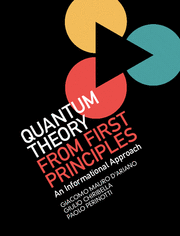Teacher: Giacomo Mauro D’Ariano
Main topics:
The quantum theory of general systems (in finite dimensions) is presented starting from simple mathematical postulates, from which the convex and operational structure of the theory is derived, along with six fundamental principles are proved: causality, local discriminability, perfect discriminability, atomicity of composition, purification, perfect compression. From these principles alone and without using Hilbert spaces, the main theorems of the theory are derived. The derivation is made in parallel with the usual derivation using Hilbert spaces, for the purpose of a conceptual deepening of the understanding of the theory. This also allows to introduce the basis of the fundamental chapters of the modern quantum theory: the quantum theories of open systems, the theory quantum theory of information and computation, and the quantum theory of optimization and estimation. Among the general topics treated in the course, there are: entanglement of states and effects, quantum operations and quantum instruments, the Choi-Jamiolkowski isomorphism, dilation theorems for quantum instruments and channels, the Lindblad equation for Markovian evolutions of open systems, metrics over states, effects and transformations, no information without disturbance theorem, steering states, faithful states, causal structure of the theory and no-signaling, no-cloning and no-programming theorems, teleportation, quantum tomography of states and processes, theory of quantum error correction, channels with memory, optimal POVMs and joint measurements of incompatible observables.
La teoria quantistica per sistemi generici (in dimensione finita) viene presentata a partire da semplici postulati matematici, dai quali si deriva la struttura convessa e operazionale della teoria, e se ne deducono sei principi fondamentali: causalità, discriminabilità locale, discriminabilità perfetta, atomicità della composizione, purificazione, compressione perfetta. Dai soli principi, senza utilizzare gli spazi di Hilbert, si deducono i teoremi fondamentali della teoria. Tale deduzione viene affiancata alla usuale derivazione che utilizza gli spazi di Hilbert, per un approfondimento concettuale della struttura della teoria. Ciò permette al contempo di introdurre le basi dei capitoli fondamentali della moderna teoria quantistica, ovvero: la teoria quantistica dei sistemi aperti, la teoria quantistica dell’informazione e della computazione, e la teoria quantistica dell’ottimizzazione e della stima. Fra gli argomenti generali trattati si hanno: entanglement di stati ed effetti, operazioni quantistiche e strumenti quantistici, isomorfismo di Choi-Jamiolkowski, teoremi di dilatazione di strumenti e canali quantistici, equazione di Lindblad per evoluzioni Markoviane di sistemi aperti, metriche su stati, effetti, e trasformazioni, teorema del no information without disturbance, stati steering, stati fedeli, struttura causale della teoria e no-signaling, teoremi del no-cloning e del no-programming, teletrasporto, tomografia di processi e stati, teoria della quantum error correction, canali con memoria, POVM ottime e misurazioni congiunte di osservabili incompatibili.

